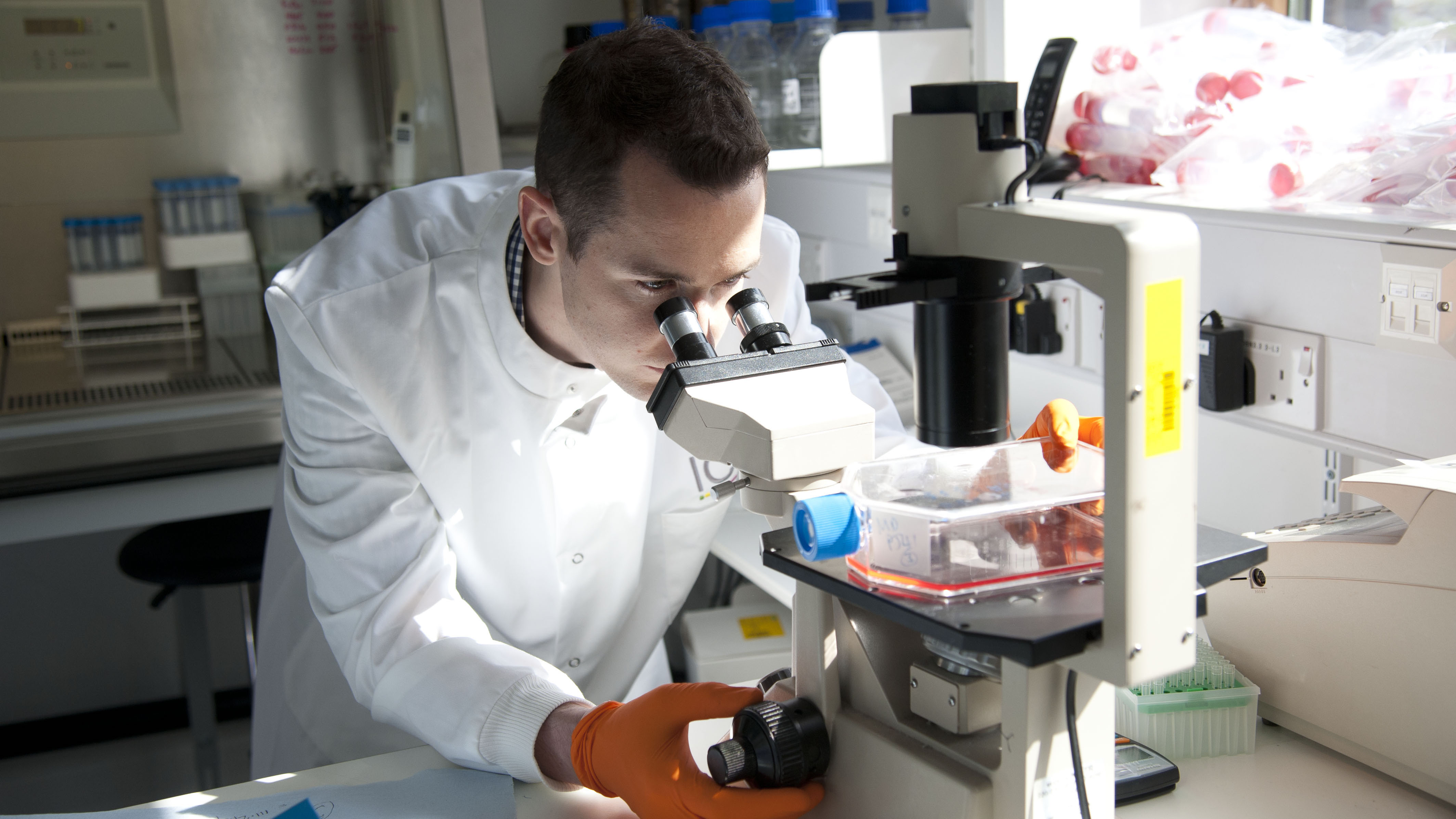
Every person with cancer has a tumour that is unique to them. Cancers follow their own particular, intricate journeys of adaptation and change over time, driven by the disease’s enormous complexity. They evolve through natural selection – the same process that has led to the development of all the species on Earth.
Often, treatment works, at least initially. But it is common too for some cancer cells to remain, intact, because of an inherent genetic ability to resist treatment. These survivors divide and replace lost cancer cells. As tumours evolve over time they often become more aggressive and gain the ability to resist further treatments.
We know that we need a new generation of treatments that can outsmart cancer, anticipating cancer’s every move to resist treatment, and blocking off its escape routes. Here are seven approaches our researchers are taking to create new treatments that can prevent or overcome drug resistance.
1. Seeing the future
Dr Andrea Sottoriva, Chris Rokos Fellow in our Centre for Evolution and Cancer, and his team are developing new mathematical tools that could in the future be used to predict the evolutionary path of individual tumours. Using genetic profiling with the latest technology, they are beginning to build detailed maps that could tell doctors before even starting treatment how a tumour will respond – in the same way that forecasters predict the weather.
2. Resistance-busting drugs
We are aiming to develop new ‘resistance-busting’ types of drug that block cancer’s ability to adapt quickly enough under the pressure of treatment.
For example, a long-term ICR research effort including Professor Ian Collins and his team has shown that one major source of resistance to both chemotherapy and radiotherapy is a protein called Chk1, which allows cancer cells to enter a ‘rest and repair’ state, and carefully rebuild broken DNA.
Our scientists have discovered a highly potent inhibitor of Chk1, which has now entered clinical trials in drug-resistant cancers.
3. Hitting new targets
There are existing drugs to target around 5 per cent of the 500 or so known cancer-causing genes – leaving around 95 per cent of the so-called cancer genome untargeted. Researchers including Dr Bissan Al-Lazikani are using big data techniques to work out which cancer-causing proteins we should be aiming to neutralise with completely new drugs, prioritising the discovery of drugs that could make the biggest difference.
4. New combination treatments
We are finding new ways to outsmart cancer using clever combinations of drugs and different treatments. Researchers at the ICR and our partner hospital, The Royal Marsden, are running trials of different types of drug in combination. Recent studies led by Professor Kevin Harrington and Dr Spiros Linardopoulos have, for example, showed that Chk1 inhibitors boost the effects of radiotherapy, and that an experimental drug targeting a cancer-causing gene called MPS1 could improve the effectiveness of chemotherapy in a range of cancer types.
5. Network drugs
Cancer cells use hugely complex networks of signalling molecules to drive their growth and spread. If we block one signalling molecule, they can often find ways around it by using other parts of the network instead.
We are exploring the ‘social’ characteristics of cancer-causing proteins – for instance, finding the nodes in these networks, which we’ve called the ‘super-Facebook users’ of cancer signalling – to find clues to which parts of these networks we might shut down with new drugs.
One long-running research programme, for example, has led to the discovery and development of Hsp90 inhibiting drugs, which take out several cancer-causing proteins at once to block cancer’s next move. These drugs have shown promise across a wide range of cancers including lung, breast, prostate, ovarian and bowel.
6. Viral immunotherapy
Our immunotherapy research is leading the way in using new types of drug to awaken the body’s own formidable arsenal of immune cells – deploying them against cancer cells that survive other more traditional forms of treatment. Several of our scientists are leading the way in developing these smarter, kinder treatments – for instance Professor Alan Melcher – and we are UK and world leaders in viral immunotherapy, which uses viruses to kill cancer cells while simultaneously flagging them up to the immune system. Professor Harrington’s work with viral immunotherapy is changing the outlook for some patients with advanced melanoma.
7. Liquid biopsies
Tackling drug resistance doesn’t only mean finding new drug types and combinations – it also means spotting when treatment has stopped working much earlier than is currently possible. Dr Gerhardt Attard is pioneering new ‘liquid biopsy’ tests in the laboratory and the clinic, for prostate cancer patients. These detect tiny amounts of tumour DNA in order to see much earlier than cancer scans if the disease is responding to treatment or whether a patient needs to change to another drug.
Support our work to combat drug resistance
We are a charitable organisation and rely on support from donors and supporters, as well as grants from major funding organisations. Please find out more about our work to combat drug resistance, including our new animation What is viral immunotherapy?, and find out how you can help us to outsmart cancer.
Watch now
comments powered by